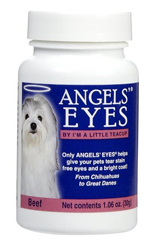Sometimes surgery is the right way to go, while other times homeopathic or herbal treatments are best. If the eye problem is caused by an underlying disease, acupuncture is often effective.
Some dog eye problems are even a result of the overuse of manmade drugs. Cataracts, for example, has been known to come from the frequent use of steroids to treat skin problems. All the more reason to integrate holistic vet care:
- What are common symptoms of an eye problem?
- What preventive measures can I take if my dog is prone to eye problems?
- The 8 most common eye problems & their treatments (in no particular order):
- Cataracts
- Corneal Ulcers
- Inflammation (Infection)
- In-growing Eyelids
- Injuries
- Irritation
- Prolapse of the Third Eyelid
- Pink Eye (Conjunctivitis) (on a different page)
Common Symptoms of Dog Eye Problems
It should be fairly obvious if your dog is experiencing an issue with her eyes. Common symptoms of dog eye problems include:
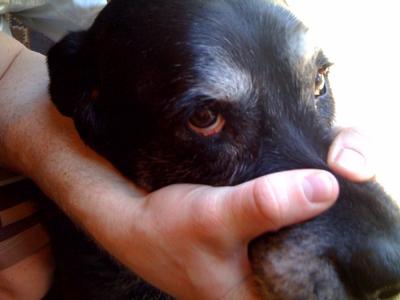
- Avoiding light
- Bulging eyes
- Closed eyes
- Cloudiness
- Discharge
- Excess tearing
- Redness
- Rubbing the eye
- Rubbing the face on the ground
It may help to see actual photos of other dogs’ eye issues along with their ultimate diagnoses…
Click here for a complete dog eye issue slideshow and click the images to jump to more detailed explanations of each photo along with our veterinarians’ responses (page will open in a new window so you can come back to finish reviewing this page).
As with most dog care issues, the cure always starts with prevention…
Preventive Eye Care
Assuming your dog wouldn’t appreciate wearing goggles – unless of course he’s trying to be stylish to catch the eye of a dog park sweetheart – preventive eye care is all about the dog food diet.
If your dog is prone to eye problems, consider adding one of the following to her diet:
- Angels’ Eyes is a good supplement on several fronts… in addition to getting rid of tear stains (as well as coat stains due to licking), it helps in the prevention of yeast and bacterial infections.
- Adding leafy green vegetables, parsley, any blue or purple berries, carrots, sesame seeds or sunflower seeds to the diet
- Supplementing the dog food diet with Zinc, Bioflavonoids, Pycnogenols, Vitamin A, Vitamin C or Vitamin D
You should also use a natural eye cleaner such as i-Clenz to keep your dog’s eyes clean and free from debris and excess discharge.
The 8 Most Common Dog Eye Problems & Their Treatments
This section reviews the details and treatment options of the eight most common dog eye problems, including…
- Dog cataracts
- Dog corneal ulcer
- Dog eye inflammation (often caused by a dog eye infection)
- In-growing dog eyelids
- Dog eye injury
- Dog eye irritation
- Prolapse of a Dog’s Third Eyelid
- Dog pink eye (on a different page)
- Your dog’s breed, age and gender
- The progression of the growth of the spot in question (timeframe, change in color, etc.)
- Advice you have received from others, if any
- What you have done to try to fix the problem, if anything
One of our My Online Vet holistic veterinarians will respond to you right away. Dog eye problem questions and answers submitted by other visitors can be found at the bottom of the page.
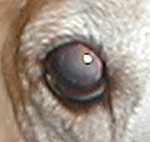 |
| Dog Cataracts |
Dog Cataracts
As with humans, dog cataracts is usually genetic and causes the clear lens behind the pupil to become cloudy or white. It causes the dog’s vision will worsen over time, eventually to the point of blindness.
See the image to the right for an example of dog cataracts.
Before jumping to any conclusions, make sure that nuclear sclerosis is not the culprit. Nuclear sclerosis (pictured lower right) is a common and normal condition of aging, where a bluish gray (not cloudy or white) change to the lens is seen. As you can tell with these images, the difference can sometimes be tough to distinguish.
 |
| Nuclear Sclerosis |
With nuclear sclerosis, vision can become blurry but it does not lead to blindness or the more significant vision problems caused by dog cataracts.
While cataracts is often genetic, it can be a result of injury or stem from chronic disease or immune problems.
For non-injury related cataracts, removing the lens surgically can help, but unfortunately the eye will never return to normal. Surgery also carries several inherent risks and doesn’t come cheap.
If stemming from an injury, there are several homeopathic treatments available, such as the use of poison hemlock. Contact your holistic veterinarian or ask our veterinarians via My Online Vet to discuss.
Treating any chronic illness – including dog cataracts – early and effectively through a proper dog food diet, holistic dog vet care, preventive natural remedies as necessary and regular check-ups is the only way to prevent the condition altogether.
Dog Corneal Ulcer
Dog corneal ulcers. Jeez – sounds pretty scary, huh? It’s not as bad as it sounds or often looks, and, although bacteria can complicate the problem, dogs usually experience a full recovery. Corneal ulcers are simply more complex dog eye injuries and are usually caused by a cat scratch, thorn or other foreign object.
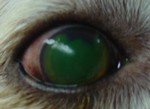 |
| Dog Corneal Ulcer |
The injury can be very difficult to see and may require the use of a special light to be diagnosed. A good sign that your dog suffers from this problem is a lot of tears or a partially closed eye.
If you see an object stuck in the eye like a thorn or debris, your dog will most likely need to receive anesthesia so a vet can remove the object. If you see blood, the injury is probably more severe and veterinary help should be sought immediately.
For slight irritations, shallow ulcers or uninfected scratches, see the treatment options under Dog Eye Irritations further down the page.
Dog Eye Inflammation (Often Caused By Dog Eye Infection)
If your dog’s eye or the area around the eye becomes inflamed, it is usually a sign of a dog eye infection. The best method for treatment is to clean it thoroughly and use special dog eye drops.
To clean the eye area including the “eye boogers”, use a comforting salt solution:
- Mix ¼ teaspoon of sea salt into a cup of distilled water. Stir well, saturate a soft cloth or gauze and carefully clean the area.
Once the area around the eyes is clean, apply one of the following:
- Mild irritation – 1 drop of almond oil
- Moderate irritation or inflamed eyes – 1 drop of castor oil (Jeff Foxworthy would probably want us to clarify: Castor Oil, NOT Castrol Oil!)
- Dry or ulcerated eyes – 1 drop of cod liver oil
Eye-Heal and Newton Homeopathics Eye Irritation are also very effective in treating and preventing eye infections.
In-growing Dog Eyelids
In-growing eyelids are a dog eye problem that can be hereditary or the result of continuous inflammation. With this condition, the eyelids turn in and press the eyelashes against they eye. The rubbing can cause a large (and sometimes white) ulcer.
To find out whether your dog’s eyelids are in-growing, gently pull the lids away from they eye and let them fall back. If the lids continuously cuff back in on themselves, you know this condition is present.
The most common treatment is a simple and effective surgery. Puppies also respond well to homeopathic treatments such as Silicea or herbal treatments like Goldenseal, which should be reviewed with your local holistic vet.
Dog Eye Injury
Dogs will be dogs, which sometimes includes sticking their noses in places they shouldn’t. Dog eye injuries can be the consequence and come in many forms such as scratches, cuts or bruising of the eyeball.
Several homeopathic remedies are available, such as Comfrey for blunt trauma to the eye or Eyebright for non-corneal injuries:
- Eyebright – i-Clenz from Native Remedies, as mentioned in the Preventive Dog Eye Care section above, uses Eyebright as one of its main ingredients. When applying directly to your dog’s eyes (in contrast to using it to clean around the eyes), dilute the i-Clenz solution by adding 2 or 3 drops to about 25 ml of warm water and apply to the eye with a cotton swab. Use a new swab for each eye.
Dog Eye Irritation
Does your dog like to pull a Superman out of your car window like ours do? As much as they love it, it does increase the likelihood that dust and debris will get into the eyes. Dog eye problems like cornea scratches and eye irritation can result.
For irritation, wash your dog’s eyes out with the following:
- Doggie Tears Eye Drops for Dog Eye Irritation – Mild:
- ¼ teaspoon of sea salt
- 1 cup distilled water
- Add the salt to the water and stir. Keep at room temperature. Apply by either dipping a cotton ball into the solution and squeezing drops into eyes or buy using a glass or plastic dropper. Apply drops until they run out of the eye.
- Doggie Tears Eye Drops for Dog Eye Irritation – Moderate:
- For more severe irritation, add exactly 5 drops of tincture (alcohol extract) of the herb euphrasia officinalis (also called Eyebright) to the Mild Doggie Tears Mixture above. Use 4 times per day.
- Treatments for slight irritations, shallow ulcers or uninfected scratches include:
- Add to the dog food diet:
- From ¼ to 1 teaspoon of Cod-liver Oil, depending on your dog’s size
- From 100 to 400 IU of Vitamin E, depending on your dog’s size
- Try the following dog eye drops:
- Every 4 hours, apply a drop of cod-liver oil directly onto the eye or into the lower lid
- Homeopathic remedies are also available, such as Monkshood. Contact your holistic veterinarian to discuss.
- Add to the dog food diet:
- You can also try gently cleansing your dog’s eyes with calendula tea, chamomile tea, eyebright tea or rosemary tea.
If your dog continues to keep his eye shut for most of the time, the injury may be more serious and you should seek veterinary help.
Prolapse of a Dog’s Third Eyelid
Did you know that your dog’s eyes have a third eyelid? It provides protection for the cornea in both dogs and cats.
The gland of the third eyelid also produces tears for the eye to help the tear gland lubricate the cornea.
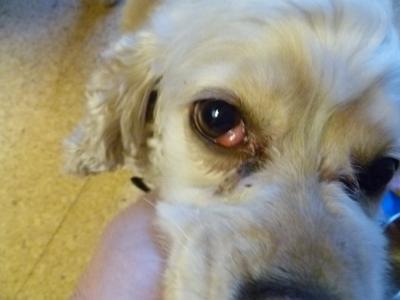
Third Eyelid Inflammation
If the gland becomes swollen, it will bulge up and over the top margin of the third eyelid. When exposed like this, it will become irritated and produce a thick yellow mucus.
A veterinarian can check the eye to confirm whether this is the problem. Sometimes a conventional veterinarian will suggest surgery to remove this gland.
Did You Know?
Reptiles and birds also have a third eyelid which is transparent, so they can see when underwater or flying through the air.
As mentioned above, you can also review a lengthy slideshow of dog eye issues and questions submitted by other visitors in our My Online Vet Ask-A-Vet Library section on Dog Eye Issues.
Do you believe in holistic pet care? If so, please tell your friends about us. Thank you for supporting our efforts!

